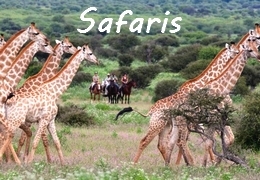-19.71405400569, 22.886667
The Okavango Delta is undoubtedly the most outstanding of Botswana’s natural wonders, a 15,000 square kilometer wilderness of floodplain and forest interlaced with lagoons and waterways, and teeming with game and birds. A riding safari through this spectacular wetland sanctuary is an exciting and memorable experience for experienced horse riding enthusiasts with a passion of nature and international travel. Botswana is quintessential African wilderness: A vast country of savannah, desert, wetlands and salt pans, making it an ideal and varied safari destination. While nearly three quarters of the country is covered by the magnificent Kalahari Desert, yet in the north lies the Okavango Delta, the largest wetland delta in the world and an amazing contrast to behold. Botswana's huge wildlife populations make for some of the best game viewing in all of Africa. On the safaris here, you regularly encounter elephant, giraffe, buffalo, zebra and a multitude of other plains game and the big cats!
This is an extremely professional establishment, owned and operated by PJ and Barney Bestelink for more than two decades. They offer the very best in African riding safaris today; among other accolades, they have most recently been given the title, 'Winnner of Best Riding Safari Property in Africa' for 2013 awarded by 'The Safari Awards.' The safaris operate in their own private concession of the Moremi Game Reserve in the Western region of the Okavango Delta. Guests will be riding for four to six hours a day through some of the most scenic and top quality game viewing areas available in the world! The immediate area includes three major river systems of the Okavango Delta: the Xudum, the Matsibie and the Kiri. These rivers have created palm islands, grassy flood plains, mopane forests and clear streams. When the flood plains are full, the horses can wade through the water from island to island. Game viewing includes the sought after Big Five, as well as equivocal African game such as meerkats, honey badgers and red lechwe.
Safari groups are kept small, which allows for a personal touch on each individual departure which usually last for five, seven or ten nights in the wilderness; your overnight accommodations will be at a selection of luxury bush camps, pending on the safaris trail chosen for the group. Kujwana Camp is the base camp with luxury tented chalets combining double or twin beds with ensuite bathrooms - each with private facilities. The other two camps - Moklowane Camp and Kiri Fly Camp - consist of dome tents or bed rolls under the stars. Meals are cooked by an expert chef and are prepared every day to suit the activities organized – saddlebag picnic breakfasts and lunches are a specialty before a three course candlelit gourmet dinner is served once back at camp. With over 50 horses schooled and brought up in the African bush, the guides can and do go to any length to make the best match of horse and rider.
The game trails you follow are sometimes the same routes used by the herds of elephant or buffalo, and when lucky, you may get the exhilarating opportunity to gallop alongside the giraffe or zebras. As you will be riding in an area of dangerous game, notably the elephant, buffalo and cats – these riding safaris in Botswana can only experienced riders who are confident and capable riding at all paces. Rides are usually early in the day to avoid the most intense heat and sun, while afternoons are spent at leisure with a siesta or relaxing bird walks or mokoro rides (water levels permitting), or jeep game drives. Non-Riders are welcome here too! They can have their own guide and enjoy game drives, walks and Mokoros while their friends are out riding.
HORSEBACK SAFARIS
SEE ALL OUR OFFER:
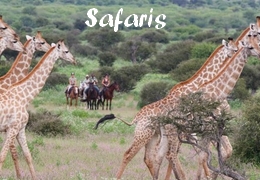
HORSEBACK RIDING SAFARI
INDICATIVE ITINERARY *
Day 1: Arrival. You are met at Maun Airport before a 25 minute transfer by helicopter straight into camp, or by light aircraft to Pompom airstrip, which is then roughly an hour’s drive to camp by vehicle or boat. Once you arrive in camp you will be given time to settle in before lunch and an introduction talk with demonstration on tack and advice on game viewing from horseback. This is followed by an orientation ride (about 1-2 hours).
Meals included: Lunch & Dinner Overnight at Kujwana Camp
Day 2: Xudum Ride. Wake up each day is 1 hour before dawn to ensure best game viewing. After breakfast, a morning ride in the Xudum area, wading through lush green malapos that lead you from island to island, surprising a timid reedbuck out his dense cover on a heavily wooded island, or enjoy the herds of lechwe and zebra moving through the open spaces. Return to camp for lunch followed by a siesta. Afternoon game drive with sunset drinks and evening night drive with a spot light to end, returning to camp for a three course candlelit meal.
Meals included: Breakfast, Lunch & Dinner. Overnight at Kujwana Camp
Day 3: Kujwana to Mokolowane. Ride from Kujwana to Mokolowane camp. This is approximately 30km ride heading northwest. The route moves through open floodplains and scattered islands towards the Matsebe river system, where you will see a wide variety of game. A picnic lunch is served on a shady island followed by siesta with camp beds, maybe a swim, and then a further 2 hours ride to Mokolowane camp. Arrive at sunset and enjoy a refreshing drink as you admire the stunning views over the floodplain. The open skylines of Mokolowane camp make for great star gazing.
Meals included: Breakfast, Lunch & Dinner. Overnight at Mokolowane Camp
Day 4: Mastsebe River Exploration. Morning game drive. This camp is on the Matsebe river system and features wide open flood plains interspersed with Mokolowane palms, favorite food of elephant and baboon. It is also a good area for plains’ game. Alternatively take a peaceful mokoro trip up the river and enjoy the tranquility of the delta from our dug out canoes. In the afternoon head out for a 2-3 hour ride and enjoy the beautiful colours of the Delta as the sun starts to sink behind the horizon.
Meals included: Breakfast, Lunch & Dinner. Overnight at Mokolowane Camp
Day 5: Mokolowane to Kujwana. A full day’s ride from Mokolowane to Kujwana with a picnic lunch along the way. The ride covers around 35 km, with 4 hours ridden in the morning and two hours in the afternoon. This ride moves through a variety of game areas fording the Xudum River at numerous hippo channels. Picnic lunch en route, arriving at Kujwana at sunset.
Meals included: Breakfast, Lunch & Dinner. Overnight at Kujwana Camp
Day 6: Departure. Early morning game ride out of Kujwana camp if flight times permit. Guests leave after breakfast. One hour’s game drive to the nearest airstrip for transfer by light aircraft into Maun or a 20 minute helicopter ride.
Meals included: Breakfast
* Sample Itinerary: subject to changes.
MEETING / DEPARTURE:
Transfers from Maun by helicopter (25 min) to the camp.
Transfers to or from Maun must be coordinated with flights BP211 and BP212 from Air Botswana or SA8300 or SA8301 from South African Airways
Land or boat transfers (depending on water levels) also available from Maun. This option takes more than 4 hours and you will not arrive at the camp in time for the day's activities.
Transfers are also available from Victoria Falls or Kasane upon request.
TRANSFERS:
Helicopter transfers from / to Maun: 365 US$ / person / transfer for a minimum of 2 persons (€ 620 round trip)
Car or boat transfers from / to Maun: 135 US$ / person / transfer for a minimum of 2 persons (€ 240 round trip)
Transfer from Kasane via plane and boat per person (min of 2), per way: 450 US$
Transfer from Kasane to Victoria Falls via vehicle: 100 US$
Transfer from Xaranna airstrip via vehicle and boat per person (min of 2), per way: 80 US$
FLIGHTS:
Flights are not included in our prices because it is generally more interesting to book your flights yourself, an inclusive tvols package is generally more expensive with agency commissions. However, we are at your disposal to help you find the best rates or to offer you a trip including transport on request: free service.
LEVEL: ![]()
Tou should be a very good rider, comfortable at the three gaits outdoors, and in very good physical condition. You are riding in an area of dangerous game and it is important that you are safe on your horse. The terrain is difficult with galloping uphill and downhill on twisty and uneven tracks, where you might encounter low branches and a small log to jump on the path.
RYTHM:
You ride 4 to 6 hours on average per day. It is a rhythmic safari, with three paces with long periods in the walk to observe the wild fauna. You usually leave early in the morning until 3 a.m. and again in the late afternoon. There can be rides all day with picnic.
GROUPS:
Groups generally up to 6-8 riders.
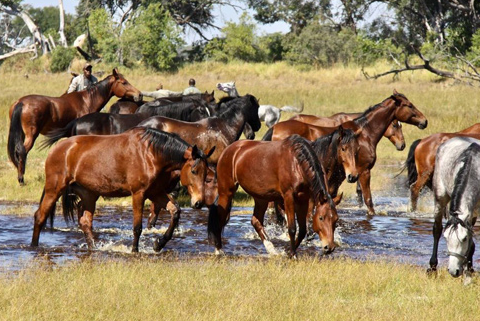 HORSES:
HORSES:
Full and part Thoroughbred, Pure Arab, Anglo Arab, Friesian cross, and Botswana Warmbloods (American Saddle bred cross African Boerperd) between 14 and 17 hands. All are well-schooled, responsive and even tempered. There is a wide range of horses (over 50) suitable for all kinds of riders. Every effort is made to match horse and rider. The horses are chosen with temperament and suitability at the forefront. Many of the horses have either been sourced through close friends in Harare, Zimbabwe or are selected from well-known breeders in South Africa. In recent years, we have carefully selected mares to join our team and using Lamu, an American Saddlebred, we are breeding more of our own horses now. When not on safari the horses freely graze the grassy molapos of the delta through the day. They graze loose and this truly is one of the amazing sights you will see while on safari with us.
TACK:
Tack is English Style and South African Trail saddles. Each saddle has a seat saver for comfort. Tack is of high quality and kept in good condition. Saddles are well known makes such as Ideals, Albion, and Symonds. Most horses are in snaffle bridles.
GUIDE & STAFF:
All rides are lead by qualified, specialized and professional guides as well as a back up guide. A keen interest is taken in birds as well as fauna and flora. Other activities including game drives, Mekoros, walks and power boats are also led by qualified, specialized and/or professional guides.
SECURITY:
All rides are led by qualified, specialized and/or professional guides and a back up guide. A 375 rifle is carried on all the rides. All camps and vehicles have radio communication and guides ride with hand held radios. A demonstration is given at the beginning of the safari with a talk on how to handle big game situations. Should an accident happen all guests are registered with a helicopter evacuation service which can get you to a hospital within 20 minutes.
A medical kit is kept in the camp.
ACCOMMODATIONS:
This is a wilderness ride, so nights will be spent in safari tents in different locations.
The first three singles to book will have their own guaranteed “no single supplement”. After this guests would be requested to share or pay a single supplement.
Accommodation - subject to changes based on availability:
Night 1, 2, & 5: Kujwana Camp
Night 3 & 4: Mokolowane Camp
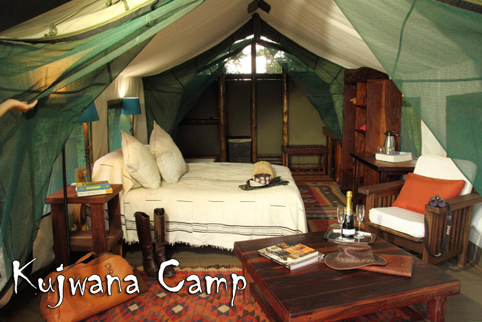 Kujwana camp: Situated on the Xudum River south west of Chiefs Island in the Okavango Delta. Tents are a mixture of pole-and-canvas lodging with sliding doors and Meru tents, with very comfortable handmade bespoke beds. There are two double-bedded tents and two twin bedded tents complete with attractive furnishings, bedside tables, hanging cupboard, luggage rack, floor rug, and chairs. Bathrooms are en-suite with flushing toilets and lovely hot showers.
Kujwana camp: Situated on the Xudum River south west of Chiefs Island in the Okavango Delta. Tents are a mixture of pole-and-canvas lodging with sliding doors and Meru tents, with very comfortable handmade bespoke beds. There are two double-bedded tents and two twin bedded tents complete with attractive furnishings, bedside tables, hanging cupboard, luggage rack, floor rug, and chairs. Bathrooms are en-suite with flushing toilets and lovely hot showers.
There are 2 spacious Riverside suites with spectacular views built on the river (The Hippo Cradle or The Rocking Horse - can be booked on request for an extra fee).
This camp has a swimming pool, a bar, and a library to keep you entertained for when you are not riding. WiFi access allows you to stay in touch with family. The camp has 220volt solar power. Limited recharging of camera batteries is possible (no hair dryers or electrical appliances). Laundry and ironing is completed every day, inclusive of total cost.
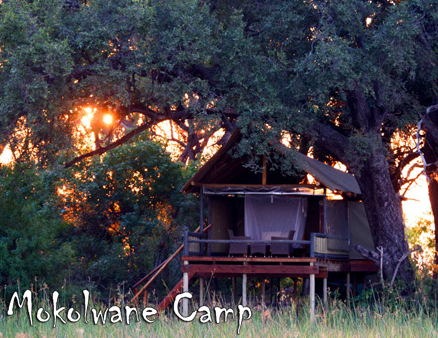 Mokolwane camp: It is North West of Kujwana on the Matsebi River which is the main feeder for Lake Ngami. This camp is situated in the open flood plains, which receive floodwater 3 weeks earlier than Kujwana camp. The vegetation consists of smaller palm islands and wide-open spaces. Mokolwane is an 8-bedded camp with 5 tree houses. The tree houses (accommodation) are 10 feet off the ground boasting superb views, each with private bathroom with flushing toilets and hot showers. There is no WIFI or laundry on this site.
Mokolwane camp: It is North West of Kujwana on the Matsebi River which is the main feeder for Lake Ngami. This camp is situated in the open flood plains, which receive floodwater 3 weeks earlier than Kujwana camp. The vegetation consists of smaller palm islands and wide-open spaces. Mokolwane is an 8-bedded camp with 5 tree houses. The tree houses (accommodation) are 10 feet off the ground boasting superb views, each with private bathroom with flushing toilets and hot showers. There is no WIFI or laundry on this site.
MEALS:
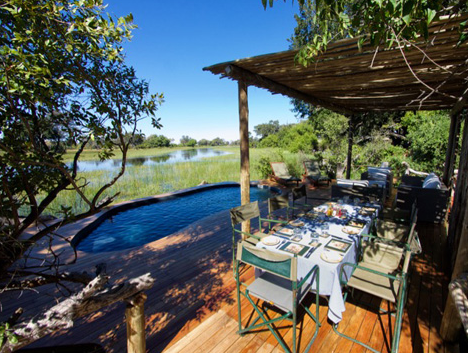 All meals are included from lunch on Day 1 to breakfast on the last day. Safari cooks prepares three meals a day including a 3 course dinner plus saddlebag snacks and vehicle support picnic lunches. Emphasis is on fresh vegetables and salads. Fresh bread is baked every day. Meals are eaten alfresco style in open aired boutique dining room, with tea and coffee served afterwards around the camp fire. Picnics are served on long tables dressed with silver ware out in the bush under a shaded tree. Beer, bottled water, an assortment of cool drinks, and a limited choice of spirits are available. Cordials, tea, and coffee are freely available, and house wine is served with dinner. We can cater to most dietary restrictions with prior notice. Please let us know at the time of booking.
All meals are included from lunch on Day 1 to breakfast on the last day. Safari cooks prepares three meals a day including a 3 course dinner plus saddlebag snacks and vehicle support picnic lunches. Emphasis is on fresh vegetables and salads. Fresh bread is baked every day. Meals are eaten alfresco style in open aired boutique dining room, with tea and coffee served afterwards around the camp fire. Picnics are served on long tables dressed with silver ware out in the bush under a shaded tree. Beer, bottled water, an assortment of cool drinks, and a limited choice of spirits are available. Cordials, tea, and coffee are freely available, and house wine is served with dinner. We can cater to most dietary restrictions with prior notice. Please let us know at the time of booking.
2023 PRICE / PER PERSON:
01/01 to 31/03: 3955 € in 2 person shared tents
02/04 to 26/05: 4650 € in 2 person shared tents
28/05 to 29/09: 5695 € in 2 person shared tents
01/10 to 01/12: 4650 € in 2 person shared tents
03/12 to 05/01: 3955 € in 2 person shared tents
TRANSFERS:
Car and boat transfers from / to Maun: 180 US$ / person / transfer for a minimum of 2 persons (360 US$ round trip)
Transfer from Kasane via plane and boat per person (min of 2), per way: 435 US$ (870 US$ round trip)
Transfer from Kasane to Victoria Falls via vehicle: 100 US$
Transfer from Xaranna airstrip via vehicle and boat per person (min of 2), per way: 105 US$ (210 US$ round trip)
Upgrade to Riverside suite, per room at Kujwana camp : 600 US$
Local tax to be paid at your arrival: 30 US$
Application fees: 15 €
* Prices may be revised down or up depending on changes in the exchange rate.
PRICES INCLUDE:
Tack and horse rental, local guides, accommodation, meals, drinks (except special wines, aperitifs, champagne), wifi access on the main camp, the financial guarantee of your payments by our deposit of travel operator .
PRICES DON'T INCLUDE:
Individual insurance, personal expenses, tips, local taxes, flights, transfers from / to Maun airport, everything not mentioned in "prices include".
INSURANCE (if you don’t already have one):
We offer to Europe Union citizens (only) Chapka insurances:
Cap Security: full insurance with cancellation. Cap Cancellation: cancellation only.
See prices & information
FLIGHTS:
Flights are not included because it is more interesting to book directly your ticket: a transport package included is generally more expensive with agency commissions. However, we are at your disposal to help you find the best prices or to offer you a flight included package on request (free service).
CLIMATE:
|
Month |
Jan |
Feb |
Mar |
Apr |
May |
Jun |
Jul |
Aug |
Sep |
Oct |
Nov |
Dec |
|
Average High Temperature (°F) |
92 |
91 |
90 |
88 |
84 |
80 |
79 |
85 |
93 |
96 |
95 |
92 |
|
Average Low Temperature (°F) |
68 |
68 |
66 |
60 |
53 |
47 |
46 |
52 |
60 |
67 |
68 |
68 |
|
Average High Temperature (°C) |
33 |
33 |
32 |
31 |
29 |
27 |
26 |
30 |
34 |
36 |
35 |
33 |
|
Average Low Temperature (°C) |
20 |
20 |
19 |
16 |
11 |
8 |
8 |
11 |
16 |
20 |
20 |
20 |
|
Average Precipitation (days of rain) |
12 |
9 |
8 |
2 |
0 |
0 |
0 |
0 |
0 |
2 |
6 |
9 |
Seasons:
October, November and February are the hottest months, with temperatures sometimes peaking to 38 degrees C at midday. The rains can start in October, with the occasional thundershower. December to February are the wettest months.
Autumn (March- April):
Weather: Last of the rains fall during March. Temperatures start to drop toward the end of April. Temp 20 – 30 degree.
Area: Normally no flood water so molapos dry. Local rains over Dec – Feb create a very green environment and top up lagoons. Rain pans holding water big attraction for game as they become more concentrated.
Game: Zebra and wildebeest start their mini migration back to the delta from the rainpans. Migrant bird species start to leave. A lot of elephant in the dry area as the clay bottomed rain pans become their main source of water. Marula trees are ripe, good food for the elephant. Good sightings of hippo and crocodile in the lagoons as they await the arrival of the floodwater.
May- start of dry season:
Weather: One of the most interesting months. The flood usually arrives in May.
Area: Dry riverbeds start flowing and the sudden growth of vegetation and sound is phenomenal.
Game: Usually exceptional game viewing on the tongue of the flood as it moves through the area.
Winter (June- July):
Weather: Coldest months especially in the evening. Pleasant during day and dry. Temperature varies 10 –20 degree. Sun shines every day. No rain.
Area: Flood normally arrives at Mokolwane mid May and Kujwana about 2 weeks later. Qwaapu receives water mid June. Exciting time to be in the delta. Watching the annual transformation of the delta. Deep wades and swimming begin.
Game: Great birding with the arrival of the floods. As the molapos start to fill they attract big herds of zebra, giraffe and impala. Large herds of buffalo. Elephant start feeding on Mokolwane palms.
Spring (August- October):
Weather: Warming up to hot.
Area: Trees start to flower. Water at its peak and starts to drop toward September and October. Molapas are green and lush. Water lilies fill the lagoons. Very pretty time of year.
Game: Migrant bird species start to arrive. Carmine bee-eaters start to nest. Wattled crane are nesting and in August the elephants feed on the fruit of the palm tree.
Summer (November)- start of rainy season:
Weather: Temperatures reach 30 – 40 degrees.
Area: Water levels dropping fast. Good ground.
Game: Ungulates i.e. impala and tsessebe start to calve. Zebra start to foal. Big herds of buffalo.

